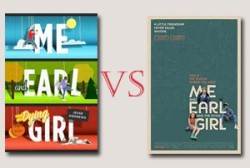Me and Earl and the Dying Girl: is the film as good as the book?
Published on: 01 July 2015 Author: Saoirse Milotte
BookTrust book reviewer Saoirse Milotte comments on Me and Earl and the Dying Girl - the book and the film. She has never seen a film rendition that does the book version justice, until now!

Having very recently read, and loved, Jesse Andrew's Me and Earl and the Dying Girl I was incredibly excited to be invited to a press screening of the film adaptation held in Soho, London. Hearing only great things about the film - its success at the Sundance Festival, its fantastic pre-release reviews - I was worried my high expectations would leave me disappointed, but I was wrong. If anything they were surpassed.
Transferring a well-loved book to the big screen is always difficult, as it is impossible to stay 100% true to the original and this is also true in this case. Some of the parts I loved most in the book were left out, such as Greg's disastrous dating history, or the school-wide screening of the worst movie ever made, but amazingly it did not take away from my enjoyment of the film. As the story is so character driven it was vital the on-screen personas matched the novel and I have to say their personalities were captured perfectly.
I was particularly impressed with newcomer RJ Cyler's portrayal of the angry yet deeply empathetic Earl, and Greg's strange but likable father, played by the flawless Nick Offerman. The two main protagonists, Greg and Rachel, were exquisitely awkward and adorable, if a little better looking than depicted in the book. A lot of this faithfulness to the original has to be due the fact that Andrews wrote the screenplay, an undeniably clever move.
What I loved most about Me and Earl and the Dying Girl was the fact it deals with a serious, sad subject without devolving into sentimental slush, and I was delighted that the film stayed true to this. It is all too easy to compare it to other 'sick-lit' such as The Fault in our Stars, although I feel Me and Earl is vastly superior,specifically when it comes to dealing with illness in an honest and believable manner, rather than romanticising it.
I was also interested to see how they would deal with the novel's erratic writing style, which often meanders into bullet points or movie scripts, and pleasingly each segment has a chapter title reminiscent of the book chapters, the rest I quickly forgot about as I was swept away by the story. The movie is peppered with nods to other great films and directors, ensuring the audience demographic will extend beyond teenagers, and allowing it to be enjoyed on several levels. The style is reminiscent of Wes Anderson, if less surreal, although Gomez-Rejon has definitely put his own stamp on it. It is beautifully shot and truly captures the heart of the story, despite the slight changes in plot.
One thing I was surprised by was the fact I left the cinema feeling like I understood Greg's character better after watching the film. In the book we only see Greg through his own, self-depreciating eyes, and when he is hard on himself you simply accept his word that he is terrible at everything. In the film you are able to take a third person stance and look at Greg as an outsider. With the veil lifted you see how clever and creative he is, how enjoyable his movies are, and how deeply he cares about things - something he tries desperately to cover up in the novel. It gave me a deeper appreciation of the character and the book as a whole and this has never happened to me before.
In fact I can honestly say I have never seen a film rendition that does the book version justice, until now. This is the first adaptation that I believe can be enjoyed before or after reading the book, although, without wanting to give anything away, I think those who watch the movie without having read the book first are in for a bigger shock.
A faithful adaptation of a brilliantly humorous, thoughtful book.
Topics: 12+, Coming-of-age, Love and romance, Bereavement, Friendship, Illness, Features






Add a comment